Geocoder is not working in some devices. So, we need to create a custom Geocoder. You can check if Geocoder is implemented by the manufactures of the device with Geocoder.isPresent() but the method is unreliable. We can't ensure the Geocoder is implemented wit it.
For custom Geocoder, you can use the following class which the usage is exactly like using the Geocoder:
import android.location.Address;
import android.util.Log;
import java.io.IOException;
import java.io.UnsupportedEncodingException;
import java.net.URLEncoder;
import java.util.ArrayList;
import java.util.List;
import java.util.Locale;
import okhttp3.OkHttpClient;
import okhttp3.Request;
import okhttp3.Response;
import org.json.JSONArray;
import org.json.JSONException;
import org.json.JSONObject;
public class MyGeocoder {
public static final String TAG = MyGeocoder.class.getSimpleName();
static OkHttpClient client = new OkHttpClient();
public static List<Address> getFromLocation(double lat, double lng, int maxResult) {
String address = String.format(Locale.US,
"https://maps.googleapis.com/maps/api/geocode/json?latlng=%1$f,%2$f&sensor=false&language="
+ Locale.getDefault().getCountry(), lat, lng);
Log.d(TAG, "address = " + address);
Log.d(TAG, "Locale.getDefault().getCountry() = " + Locale.getDefault().getCountry());
return getAddress(address, maxResult);
}
public static List<Address> getFromLocationName(String locationName, int maxResults) {
String address = null;
try {
address = "https://maps.google.com/maps/api/geocode/json?address=" + URLEncoder.encode(locationName,
"UTF-8") + "&ka&sensor=false";
return getAddress(address, maxResults);
} catch (UnsupportedEncodingException e) {
e.printStackTrace();
}
return null;
}
private static List<Address> getAddress(String url, int maxResult) {
List<Address> retList = null;
Request request = new Request.Builder().url(url)
.header("User-Agent", "OkHttp Headers.java")
.addHeader("Accept", "application/json; q=0.5")
.build();
try {
Response response = client.newCall(request).execute();
String responseStr = response.body().string();
JSONObject jsonObject = new JSONObject(responseStr);
retList = new ArrayList<Address>();
if ("OK".equalsIgnoreCase(jsonObject.getString("status"))) {
JSONArray results = jsonObject.getJSONArray("results");
if (results.length() > 0) {
for (int i = 0; i < results.length() && i < maxResult; i++) {
JSONObject result = results.getJSONObject(i);
Address addr = new Address(Locale.getDefault());
JSONArray components = result.getJSONArray("address_components");
String streetNumber = "";
String route = "";
for (int a = 0; a < components.length(); a++) {
JSONObject component = components.getJSONObject(a);
JSONArray types = component.getJSONArray("types");
for (int j = 0; j < types.length(); j++) {
String type = types.getString(j);
if (type.equals("locality")) {
addr.setLocality(component.getString("long_name"));
} else if (type.equals("street_number")) {
streetNumber = component.getString("long_name");
} else if (type.equals("route")) {
route = component.getString("long_name");
}
}
}
addr.setAddressLine(0, route + " " + streetNumber);
addr.setLatitude(
result.getJSONObject("geometry").getJSONObject("location").getDouble("lat"));
addr.setLongitude(
result.getJSONObject("geometry").getJSONObject("location").getDouble("lng"));
retList.add(addr);
}
}
}
} catch (IOException e) {
Log.e(TAG, "Error calling Google geocode webservice.", e);
} catch (JSONException e) {
Log.e(TAG, "Error parsing Google geocode webservice response.", e);
}
return retList;
}
}

